
How to Remove and Reset Face ID on Apple iPhone SE

How to Remove and Reset Face ID on Apple iPhone SE
Did you go wrong when you set the Face ID the first time? Or are you tired to put off the mask to use Face ID to unlock your Apple iPhone SE? And now, you want to disable the Face ID. Whatever your reasons are, read this article to learn how to remove Face ID on your Apple iPhone SE X, iPhone XS, iPhone XR or iPhone 11, iPhone 12, iPhone 13, iPhone 14, anmd iPhone 15.
Part I: What is Face ID?
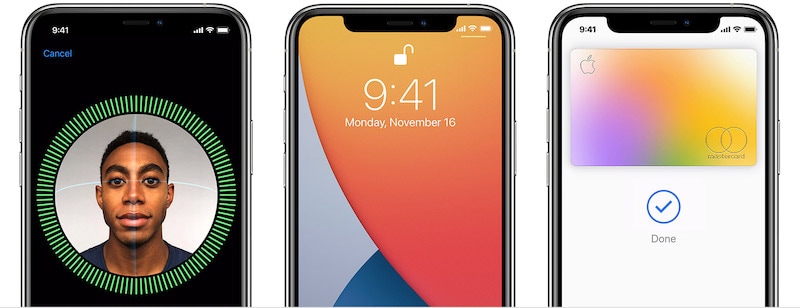
If the new Apple iPhone SE is your first-ever iPhone, or if you have neither upgraded your Apple iPhone SE from the 6/7/8 series nor have kept abreast with the happenings in the Apple world, you might wonder what this newfangled thing called Face ID is.
Face ID is an authentication system that came with iPhone X for the first time, and then the Apple iPhone SE 13, the Apple iPhone SE 14, and now the Apple iPhone SE 15. Like Touch ID that uses your fingerprints, Face ID uses your face metrics to authenticate you for everything, the way Touch ID does.
Face ID is not a new and advanced version of Touch ID, but a completely different authentication system that utilizes a different component what Apple calls a TrueDepth camera to scan your face metrics. Face ID is not available on phones with Touch ID (iPhone SE 2022 today) and Touch ID is not available on iPhones that come with Face ID as their authentication mechanism.
Part II: What Can You Do with Face ID?
Most of us know that we can unlock iPhone with our face via Face ID instead of a thumbprint or passcode. But actually, Face ID does more than just that. Let us learn more cool things you can do with Face ID, which helps you to make a decision if you still want to disable it. Here‘s what you can do on your Apple iPhone SE 13/12/11 with Face ID:
II.I Unlock Your Apple iPhone SE
As an authentication mechanism, Face ID enables you to unlock your Apple iPhone SE 13 /iPhone 12/iPhone 11 with a look. How to do that? Here are the steps:
Step 1: Pick your Apple iPhone SE up in your hands or tap the screen to wake it up.
Step 2: Look at the iPhone.

When the lock symbol changes to the unlocked position, you can swipe up to unlock your Apple iPhone SE using Face ID and get to the Home Screen.
Note that Face ID will not work in landscape mode on an iPhone.
II.II Making Purchases Using Face ID on Your Apple iPhone SE
Face ID allows you to authenticate yourself to make purchases in the App Store, Book Store, and iTunes Store and use Apple Pay wherever supported.
How to use Face ID on Apple iPhone SE to make purchases in App Store, Book Store, and iTunes Store
Step 1: Check if Face ID is enabled for purchases in these stores by going to Settings > Face ID and Passcode and ensuring that iTunes and App Store are toggled On.

Step 2: On any of these stores, when you tap on the option to buy some content, a payment confirmation popup will be displayed along with instructions to authenticate yourself using Face ID.
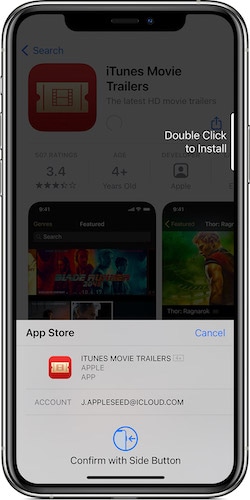
The instructions are simple: press the side button twice to authenticate yourself using your Face ID and make the purchase.
When done, a satisfying ting and a checkmark will confirm the action.
How to use Face ID on Apple iPhone SE to pay with Apple Pay
Step 1: If Apple Pay is supported by banking institutions in your country, you can set it up by adding a supported bank‘s credit card, debit card, or prepaid card to the Wallet app on your Apple iPhone SE 13/12/11.
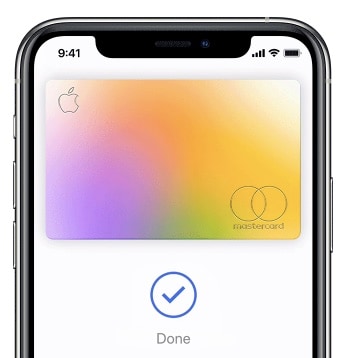
Step 2: When a card is added and ready to use, check that Apple Pay is enabled under Settings > Face ID and Passcode.
Step 3: For App Store/ Book Store/ iTunes Store purchases, it works as always, you double-press the Side Button to authenticate and use your default card.
Step 4: Look at your Apple iPhone SE to authenticate yourself using your Face ID and make the purchase.
Step 5: When paying at retail outlets, hold your Apple iPhone SE (top being close to the reader) and wait for the checkmark and Done message.
Step 6: To pay using Apple Pay on websites, choose Apple Pay as the payment method, double press the Side Button, look at your Apple iPhone SE, and wait for the Done message and checkmark to finish the process.
II.III Lowering Ringer and Alarm Volume Automatically
Face ID also enables what Apple calls Attention Aware features that are conveniences afforded to users who have a Face ID enabled iPhone.

Setting up and using Attention Aware features is easy:
Step 1: Go to Settings > Face ID and passcode.
Step 2: Toggle Require Attention For Face ID On.
Step 3: Toggle Attention Aware Features On.
That‘s it. Now, when you get a call and your Apple iPhone SE 13 is ringing loud, looking at your Apple iPhone SE 13/12/11 will cause it to lower the volume. When an alarm goes off, you can lower the volume by simply looking at your Apple iPhone SE. Additionally, your Apple iPhone SE screen will not dim or switch off for the duration you are looking at it. This means you can now read those books on Kindle without constantly tapping the screen for it to stay awake.
II.IV Filling Passwords in Safari Automatically Using Face ID
Face ID also allows users to fill passwords in Safari automatically for a faster and more convenient login experience on your Apple iPhone SE with Face ID.
Step 1: Go to Settings > Face ID and Passcode and toggle Password Autofill On.
Step 2: Now, when you use Safari to open a website that requires a login, tapping the username field or password field will bring up the keyboard, and on top of that keyboard there will be your credentials for the website if you have saved them in iCloud Passwords. Tap the credentials.
Step 3: Look at your Apple iPhone SE to authenticate yourself with Face ID and Safari will autofill the credentials for you.
II.V Animojis and Memojis
Up until now, we saw how Face ID enables productivity features and how convenient it is to use it. Now, we come to the fun part - Animojis. Apple launched Face ID in 2017 on the Apple iPhone SE X with much fanfare and a huge part of that fanfare was Animojis. Over time, Apple brought new capabilities to the Apple iPhone SE and added Memojis alongside Animojis.

Animojis are animated emojis. These are made possible with advanced algorithms enabled by the TrueDepth camera in Face ID. Animated emojis or Animojis can mimic your facial expressions and you can use them in your message conversations in apps.
Here‘s how to send Animojis in conversations on your new iPhone 13/12/11:
Step 1: Open a message conversation in the Messages app.
Step 2: Tap the Memoji button (a character in a yellow frame) and swipe to select the desired Animoji/ Memoji you want to send.

Step 3: Tap the Record button and you now have 30 seconds to do what you want with your face and the character will reproduce it on screen for you.
Step 4: When done, the Record button changes to Send:

Tap Send to send your first Memoji/ Animoji.
Part III: How to Remove Face ID on Apple iPhone SE
For all the hardware and software that make for a great experience for nearly all users around the world, Face ID can have its fair share of issues. Sometimes, your face might not get recognized, sometimes it might not work altogether.
Lately, with the COVID-19 pandemic, we have seen how Face ID struggles to work for us, and why? Because it cannot scan our faces with masks! So, it makes sense to remove Face ID from our iPhones and rely solely on passcodes. Alternatively, you want to reset your Face ID on your Apple iPhone SE 13/12/11 and set it again if you have put on some ‘COVID weight’ owing to working from home.
Most of the time, the best and the simplest thing you can do to resolve your hardware and software issues is to restart the Apple iPhone SE device in question. To restart your Apple iPhone SE 13/12/11, long-press the Side Button until the power slider appears and drag it to shut the Apple iPhone SE device off. Then, use the Side Button to start the phone again.
Sometimes, the issues have a way of persisting, and a restart does not resolve them. the TrueDepth system might have developed a fault and Face ID might stop working. Or you got the dreaded “problem detected with TrueDepth camera” message on your Apple iPhone SE 13/12/11. In that case, you would like to know how to reset and remove Face ID on your Apple iPhone SE 13 to see if that helps, before you are required to go to an Apple Store for service.
Step 1: Go to Settings > Face ID and Passcode.
Step 2: Scroll and tap the option “Reset Face ID” to remove Face ID on your Apple iPhone SE 13/12/11.

Part IV: How to Set Up Face ID on Your Apple iPhone SE
Sometimes, you may just want to disable Face ID temporarily or the issue gets solved, and want to activate Face ID again. Setting up a Face ID on your Apple iPhone SE 13 is easy. To set up Face ID, sit in a comfortable spot with adequate lighting and follow these steps:
Step 1: Go to Settings > Face ID and Passcode and enter your passcode. If you have not set up a passcode yet, you will necessarily have to create one now before proceeding forward.
Step 2: Tap Set Up Face ID to start the process.
Step 3: Hold your Apple iPhone SE in the portrait orientation at about an arm‘s length away from your face and then tap Get Started.

Step 4: Adjust to have your face inside the shown circle and then slowly rotate your head in a smooth motion to complete the circle. This step will be done one more time.
Step 5: When done, tap Done.
In case you are getting the following error:

There are a few things you can try to resolve this, you can try to update your Apple iPhone SE 13/12/11 to the latest iOS. At this point, you may even try running a beta version to see if that helps. If you are running a beta version, you may downgrade back to the release version to see if that resolves the error. Betas can both make and break things.
If this does not resolve it, you need to take the Apple iPhone SE device to the nearest service center. The TrueDepth camera system has components that might have been damaged or might not be working properly, for whatever reason, and the service personnel is equipped to resolve this issue for you at the earliest.
Part V: The Bottom Line
Face ID is more than a nifty authentication system in iPhones (and iPads) and brings some unique features that are not found in previous Touch ID enabled devices and enable the users to interact with people (Animojis and Memojis) and with the Apple iPhone SE (user authentication via facial metrics, Attention Aware features) in new ways. There are times when this does not work as expected, and you can reset and remove Face ID if you feel this is not your cup of tea. Apple iPhone SE can be used solely with passcodes if you want. If you find that your screen is locked and you can‘t unlock it, you can always find help in tools such as Dr.Fone - Screen Unlock (iOS). So go ahead, use the new Face ID on your Apple iPhone SE with confidence, and enjoy a more secure experience on your new iPhone than ever before.
Dr.Fone - Screen Unlock (iOS)
Unlock iPhone/iPad Lock Screen Without Hassle.
- Simple, click-through, process.
- Unlock screen passwords from all iPhone and iPad.
- No tech knowledge required, everybody can handle it.
- Supports iPhone 13/ iPhone XS (Max) / iPhone XR / iPhone X / 8 (Plus)/ iPhone 7(Plus)/ iPhone6s(Plus), iPhone SE and the latest iOS version fully!

4,395,217 people have downloaded it
Apple iPhone SE Asking for Passcode after iOS 17/14 Update, What to Do?
If you’ve recently updated your iOS iPhone and iPad to the iOS 17/14 operating system, you may notice a bit of a bug where the Apple iPhone SE displays the passcode lock, even if you haven’t got a security code in place.
This obviously means you won’t be able to access your phone, and in many cases, you’re going to want to get back into your phone as quickly as possible. However, this may be easier said than done. Fortunately, today we’re going to go through multiple solutions to help you get your device working as it should!
Part 1. Don’t try passcodes blindly
One of the worst things you can do when faced with this situation is to enter passcodes blindly. Perhaps you’re trying random numbers and letters, or you’re trying passwords you’ve used in the past. If you get it wrong, you’re going to be locked out of your device for a long time.
The more times you get your code wrong, the longer you’ll be locked out, so avoid doing this at all costs, so make sure you move straight onto these approaches to get your phone working as quickly as possible.
Part 2. 5 ways to unlock iPhone after iOS 17/14 Update
2.1 Try a default passcode in your family
While we said, you shouldn’t type in random numbers to try and guess the password, of course, if you have a standard family passcode that you use across all iOS devices, perhaps an admin password or just something you use for everything, it can be well worth a try.
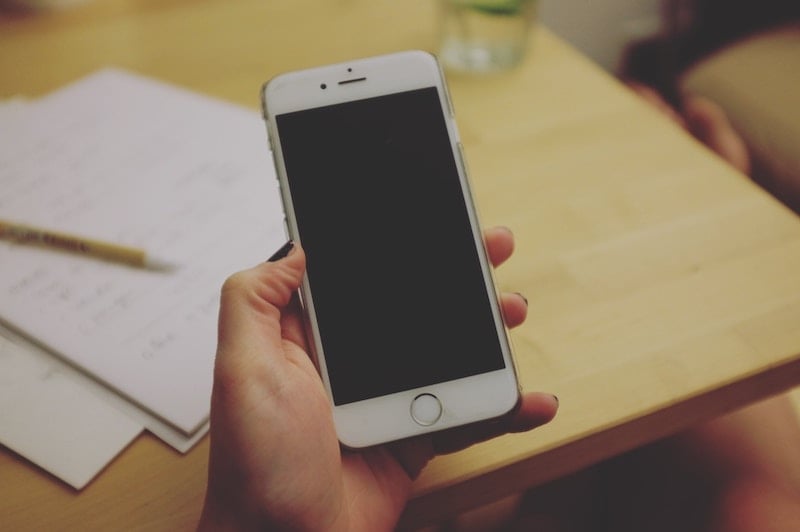
In reality, you get three attempts to put a passcode in before it locks you out, so try two passcodes that your family uses to see whether this will easily unlock your device. If you brought your device preowned and still have contact with the owner, they may have a passcode you can try.
2.2 Unlock iPhone with an unlock tool
The second approach you can take if you don’t know the passcode and can’t get it unlocked is to use a powerful software solution known as Dr.Fone - Screen Unlock (iOS) . This Wondershare software application completely unlocks your phone, even if you don’t know the passcode.
This software is easy to use and incredibly simple, yet it gets the job done. If you’re looking for a quick way to get your iOS device back up and running with full access after an iOS 17/14 update, it doesn’t get much better than this. Here’s how it works;
Step 1. Download and install the Dr.Fone - Screen Unlock (iOS) software to either your Mac or Windows PC and open it, so you’re on the homepage. Connect your iOS device to your computer using the USB cable and wait for the software to recognize your device.
When it does, close iTunes if it automatically opens and clicks the Screen Unlock option from the main menu.

Step 2. Click the Unlock iOS Screen option.
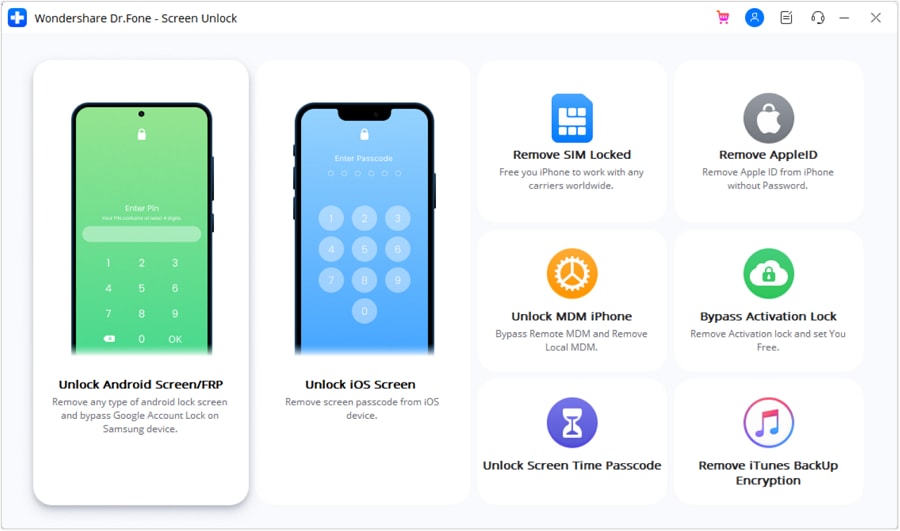
Step 3. You will now need to put your device in DFU mode, also known as Recovery Mode. Fortunately, this is easy thanks to the on-screen instructions where you will hold down the volume down and power button for a few seconds.
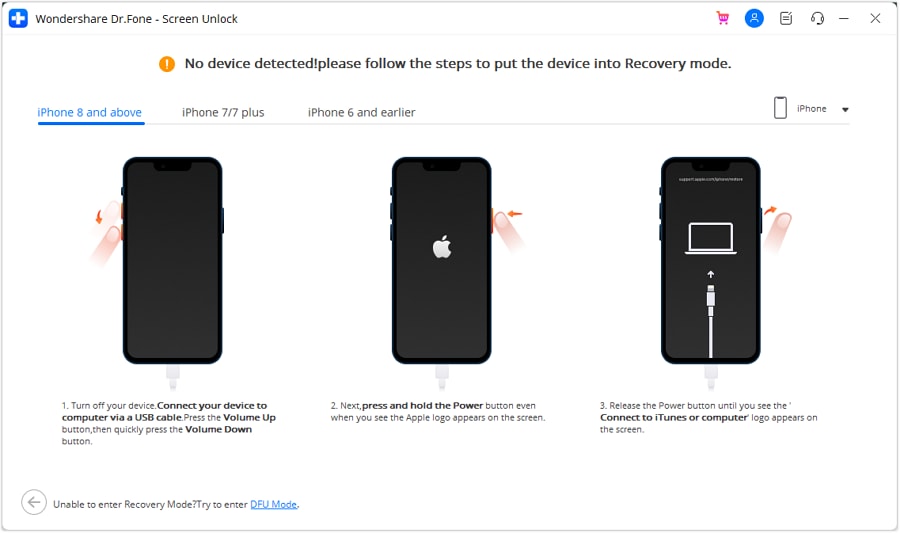
Step 4. Once Dr.Fone - Screen Unlock (iOS) has detected your device in DFU Mode. You’ll be able to select which device you’re using and what firmware you want to be repaired; in this case, iOS 17/14.
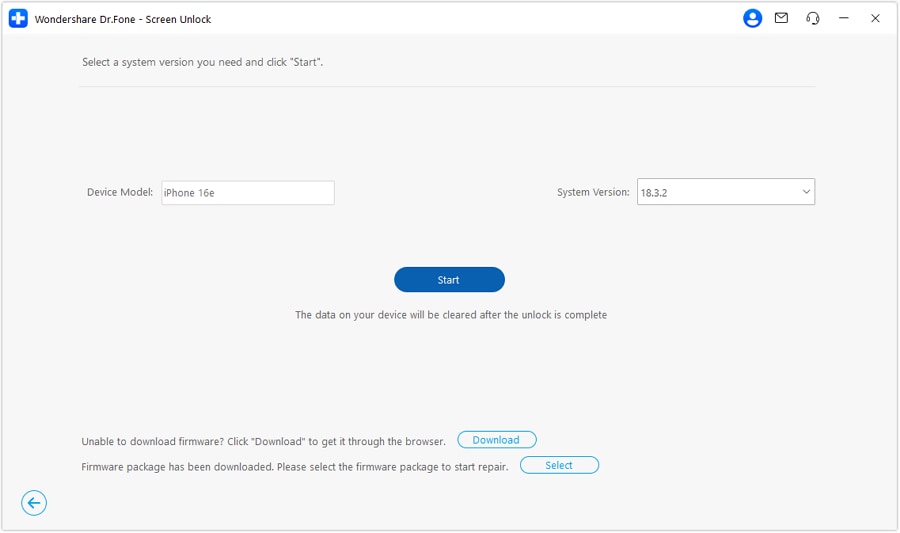
Step 5. Once everything has been confirmed and you’re happy to continue, press the Unlock option. The program will do its thing, and when it’s done, the software will say you’re able to disconnect your Apple iPhone SE and use it without a lock screen!
That’s how easy Dr.Fone - Screen Unlock (iOS) makes the entire unlock process!
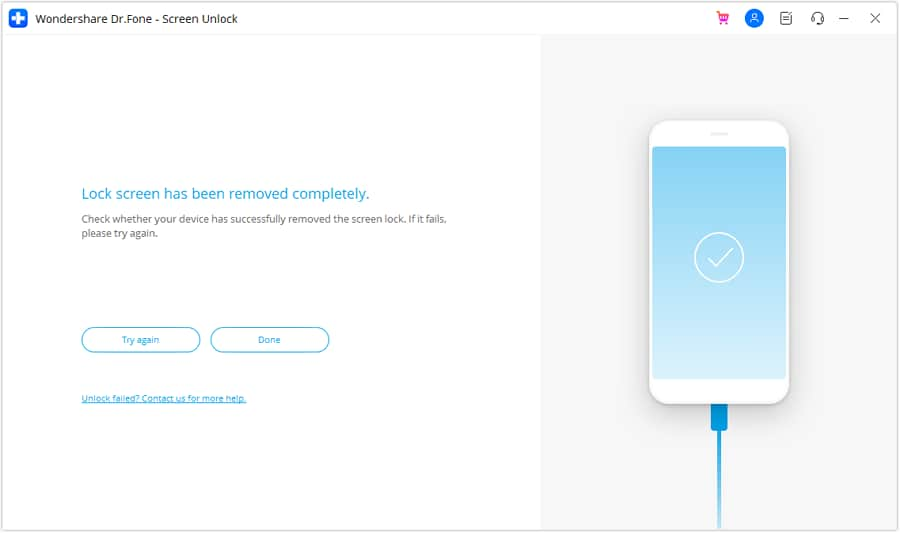
2.3 Restore an old backup from iTunes
Another key way that some users have found to unlock their device after an update is to restore their device to an older version, aiming to put your device back into a position where it didn’t have a lock screen.
It’s only possible to do this if you’ve backed up your iOS device in the past (which is why you’re encouraged to back up regularly), and it can all be done through the iTunes software on either your Mac or Windows computer. Here’s how it works;
Step 1. Ensure you’re running the latest version of iTunes and then connect your iOS device to your Mac or Windows computer using the official USB cable. This should automatically open the iTunes window.
Step 2. In iTunes, click the symbol representing your device and then click Summary. On this screen, you’ll be able to choose the Restore iPhone option at the top to begin the restoring process.
Step 3. Follow the onscreen instructions where you’ll choose which backup file you want to use before iTunes, then restores your device. When the software has completed the process, you’ll be able to disconnect your Apple iPhone SE and use it without a lock screen!
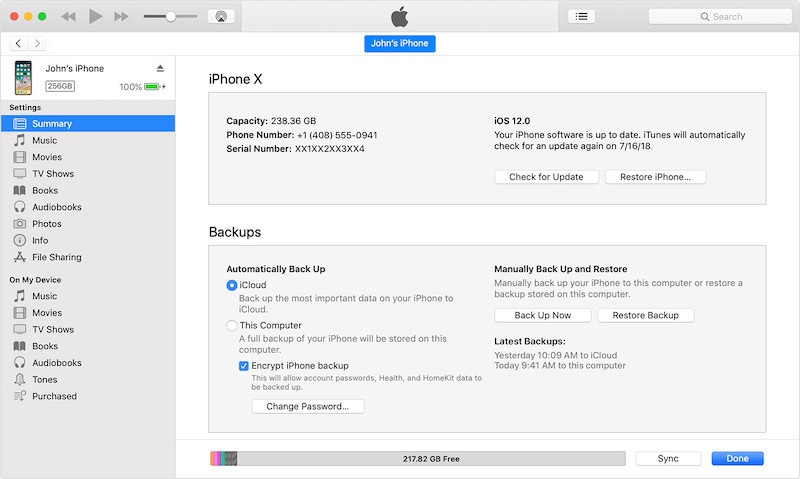
2.4 Restore in recovery mode
In some cases, restoring your device using just iTunes will not be good enough, and it won’t have the effect you’re looking for; in this case, restoring your device with no lock screen after an iOS 17/14 update.
If the above method of restoring your device via iTunes doesn’t work, or you haven’t got a backup file to load, you’ll need to restore your device using a move known as Recovery Mode, or DFU mode. This will hard reset your device and get it working to its full potential.
Here’s how to do it. (Note, the process will differ slightly depending on which model of iPhone you’re using).
Step 1. Press and hold the volume up button for about one second, and then switch and press the Volume Down button for the same amount of time. You can then hold the side button (on devices without a home button), and the following screen should appear after a few seconds.
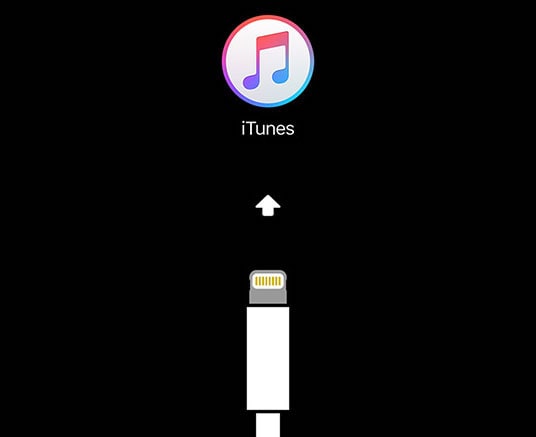
Step 2. Now connect your Apple iPhone SE to your computer with iTunes and wait for iTunes to open. Make sure you’re running the latest version of iTunes before connecting up your device. Also, make sure you’re using the official USB cable for the most stability.
Step 3. iTunes should automatically detect that your device is in Recovery Mode and automatically restore your device to a default state without a lock screen. Wait until this process is completed before disconnecting your device and using it as normal.
2.5 Use Find My iPhone feature in iCloud
The fifth and final approach you can take to removing a lock screen from your recently updated iPhone or iPad when faced with the iOS 17/14 glitch is taking advantage of the integrated Apple technology and features are known as Find My iPhone.
While this feature originally allows you to literally find your Apple iPhone SE in the situation where it’s lost and offers many other security features to help ensure your device and data don’t fall into the wrong hands, you can also use it to remove your device unwanted lock screen.
Of course, this will only work if the Find My iPhone features have been enabled in the past, so make sure you’re using it to get it to work. Here’s how to use the feature to get your phone access back.
Step 1. From your computer, iPad, tablet, or mobile web browser, head over to iCloud.com and log into your iCloud account using the login in button at the top of the screen.
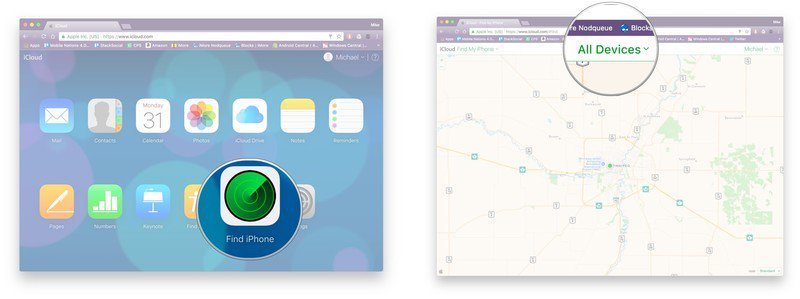
Step 2. Once signed in, scroll down the menu of features and select the Find iPhone feature. Click on the All Devices option at the top.
Step 3. From the list of devices connected to your account, click the Apple iPhone SE device name with the locked screen and then click the Erase option. This will clear everything from your device, much like the process we’ve spoken about in the methods above.
Leave the Apple iPhone SE device to erase, and once completed, you’ll be able to pick up and use your phone as normal without a lock screen. You should also now be able to update to iOS 17/14 without any problems!
Summary
And there you go, the five key ways you need to know when it comes to removing an unwanted lock screen from your iOS device after an iOS 17/14 update. We highly recommend the Dr.Fone - Screen Unlock (iOS) since the software makes the whole process incredibly easy, especially when managing any problems you may have on your iOS device!
7 Ways to Lock Apps on Apple iPhone SE and iPad Securely
Are you concerned about your privacy and would like to secure certain apps on your iOS device? Don’t worry! There are plenty of ways to app lock the Apple iPhone SE and protect your privacy. You can follow the same drill to restrict the usage of certain apps for your kids as well by taking the assistance of the Apple iPhone SE app lock feature. The app lock for iPhone and iPad options can be used pretty easily. There are plenty of native and third-party solutions out there that you can use. In this post, we will make you familiar with seven different techniques on how to lock apps on iPhones and iPads.
Part 1: How to Lock Apps on iPhone with Screen Time?
Utilizing Screen Time on your Apple iPhone SE offers a versatile way to manage app access. It is done through time restrictions and a dedicated passcode. By implementing Screen Time settings, you can exercise control over app usage. It ensures added security and regulated access to your preferred applications. Now, let’s walk through the steps to learn how to lock apps on iPhone Screen Time:
Step 1. Begin by accessing the Settings on your iOS device and tapping on the “Screen Time” option. On the ensuing screen, tap “App Limits,” followed by “Add Limit.”
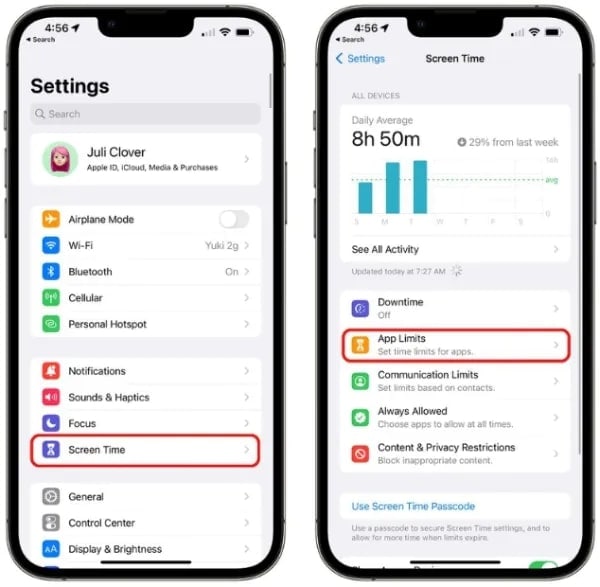
Step 2. Select the apps or categories of the apps, tap “Next,” and choose the “Time Limit” for the selected apps. After deciding the time limit, press “Add” from the top right corner to add an app limitation.
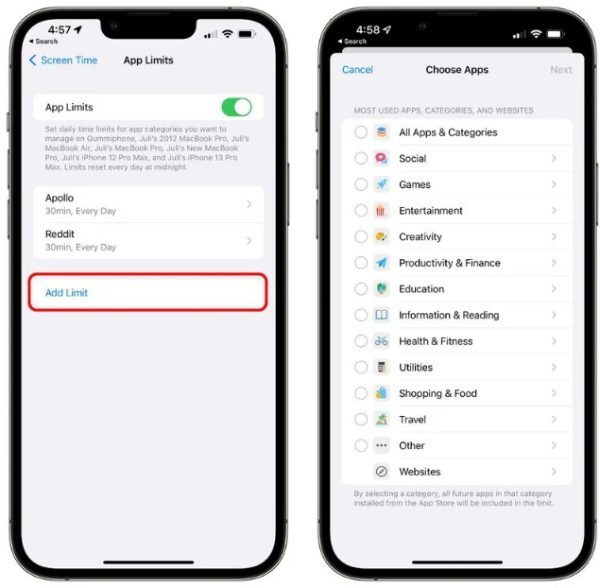
Part 2: How to Lock Apps on iPhone with Face ID & Passcode?
Leveraging the advanced security capabilities of Face ID or Passcode on your Apple iPhone SE X or later models effectively fortifies app access. By using facial recognition or passcodes, you can put in place an extra layer of protection. It can be done for specific apps, safeguarding your sensitive data from unauthorized access. Now, let’s proceed with the detailed steps to lock apps using Face ID or Passcode on your iOS device:
Step 1. After opening the Settings app on your Apple iPhone SE, scroll down to access “Face ID & Passcode.” Here, you will be required to provide the passcode of your device.
Step 2. After providing the passcode, select “Other Apps” and check the apps that have Face ID enabled. Remember, you’re unable to manually include apps in the list. Only those apps that have sought access to the feature will appear here automatically.

Part 3: How to Lock Apps on iPhone Using Shortcuts?
If you are unable to lock the targeted app directly with Face ID, there is no need to worry. There exist workarounds that you can use, and one of them is using the Shortcuts app. It won’t directly lock apps with the Face ID. Instead, it provides a workaround by creating a shortcut that redirects to the lock screen.
When activated, it takes you to the lock screen, prompting Face ID, Touch ID, or Passcode to access the Apple iPhone SE device again. Use the following steps to lock your apps using the Shortcuts app:
Step 1. On your Apple iPhone SE, launch the Shortcuts app and select the “Automation” tab from the bottom toolbar. There, tap “New Automation” and use the search bar to look for and select “App.”

Step 2. Now, tap “Choose” in front of the “App” and select the app you want to lock. Now, move down and select “Is Opened,” then move further down to choose “Run Immediately.” Here, leave “Notify when Run” deactivated.

Step 3. Proceed forward by tapping “Next” from the top right corner, and on the following screen, tap “New Blank Automation.” Then, press “Add Action” and enter “Lock Screen” into the Search field, then choose “Lock Screen” from the search results.

Step 4. Finally, tap “Done” to finalize the shortcut. Now, upon accessing the targeted app, the shortcut will activate in the background, causing your Apple iPhone SE to be locked. You can then use the Face ID, Touch ID, or passcode to unlock it.

Part 4: How to Lock Apps on iPhone Using Restrictions?
By taking the assistance of Apple’s native Restrictions feature, you can app lock the Apple iPhone SE without any trouble. In this way, you can set up a passcode that needs to be matched before accessing any app. This iPhone app lock is also a great way to restrict your kids from accessing certain apps or making purchases. To learn how to lock apps on iPhone or iPad using Restrictions, follow these steps:
Step 1. Unlock your device and go to its Settings > General > Restrictions.
Step 2. Turn the feature on and set up a passcode for app restrictions. To provide added security, you can set up a passcode that is not similar to your lock screen passcode.
Step 3. Now, you can set up an app lock for iPhone using Restrictions. Simply go to General > Restrictions and turn this feature on for any app of your choice.
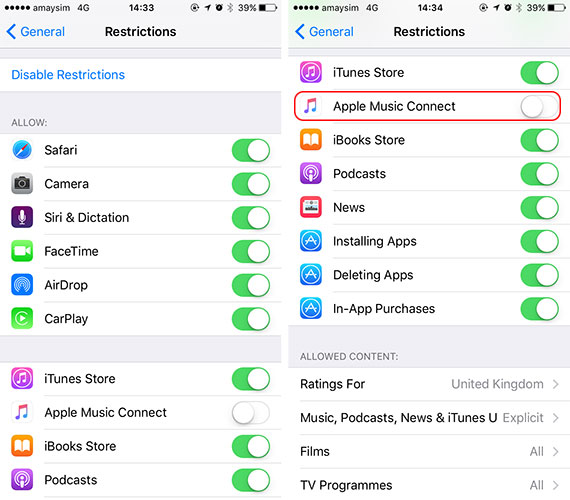
Step 4. If you want, then you can also switch this feature off for any app using the same method.
Bonus Tip: How to Unlock iPhone withoutScreen Locks (PIN/pattern/fingerprints/face)
It can be a trouble if you forget your Apple iPhone SE passcode since there are many restrictions on using iPhone. Also, if you are still unable to verify your Apple ID by using the above ways you may consider removing your Apple ID on your iOS devices. Here is an easy way to help you bypass Apple ID without a password and 100% working, which is to use Dr.Fone - Screen Unlock (iOS). It’s a professional iOS unlocker tool that can help you remove various locks on iPhones and iPads. With only a few steps, you can easily remove your Apple ID.
Dr.Fone - Screen Unlock (iOS)
Remove iPhone iPhone-locked screen without Hassle.
- Unlock an iPhone whenever the passcode is forgotten.
- Save your Apple iPhone SE quickly from the disabled state.
- Free your sim out of any carrier worldwide.
- Works for all models of iPhone, iPad, and iPod touch.
- Fully compatible with the latest iOS.

4,008,670 people have downloaded it
Part 5: How to Lock Apps on iPhone Using Guided Access?
Besides the Restrictions feature, you can also take the assistance of Guided Access to lock a certain app on your device. It was originally introduced in iOS 6 and can be used to restrict your device temporarily with the usage of a single app. It is mostly used by parents who would like to restrict their kids from using a single app while lending their devices. Teachers and people with special needs also use Guided Access pretty frequently. To learn how to lock apps on iPhone using Guided Access, follow these steps:
Step 1. To start with, go to your device’s Settings > General > Accessibility and tap on the “Guided Access” option.

Step 2. Turn on the “Guided Access” feature and tap on the “Passcode Settings”.

Step 3. After selecting the “Set Guided Access Passcode” option, you can set up a passcode to use it as an app lock for iPhone.
Step 4. Now, simply launch the app that you want to restrict and tap the Home button three times. This will start the Guided Access mode.

Step 5. Your phone would now be restricted to this app. You can further restrict the usage of certain app features as well.
Step 6. To exit the Guided Access mode, tap the Home screen three times and provide the respective passcode.

Part 6: How to Lock Apps on iPhone with Touch ID?
On the Apple iPhone SE 8 Series and iPhone SE, Apple offers Touch ID for security. In the process, it is similar to the Face ID available on the later iPhones. If you have an iOS device with Touch ID, here are the steps you can follow for the app lock iPhone process:
Instructions: To start, open the Settings application. Now scroll down to locate and select the “Touch ID & Passcode” option. On the following screen, you can deactivate or activate Touch ID for apps.

Part 7: How to Lock Apps on iPhone Using Third-Party Apps?
1. Lock Apps onApple iPhone SE & iPad via Famisafe
If the reason you want to lock the apps on your Apple iPhone SE has to do with managing your kid’s phone usage, we have an excellent alternative for you. FamiSafe is a reliable parental control app that offers features to monitor and manage a child’s device usage. It focuses on parental controls, including features like screen time management, location tracking, web filtering, and activity monitoring.
It offers robust controls to restrict overall device usage, set screen time limits, and monitor app usage. This helps parents guide and regulate their children’s activities on iOS devices. You can use the following steps to lock apps using FamiSafe:
Step 1: Install FamiSafe and FamiSafe Jr on Respective Devices
Get FamiSafe from the App Store and log in using your Wondershare ID or your Apple, Google, or Facebook account. Select the parent mode and link your child’s phone by installing FamiSafe Jr on their devices using either the QR code or the pairing code. Once the pairing is done, input details about your children and allow FamiSafe Jr to oversee their devices.

Step 2: Provide the Necessary Permissions to FamiSafe
Now, activate Accessibility for FamiSafe by accessing “Settings,” tapping “FamiSafe,” and enabling “Location.” Then, grant access to the Apple iPhone SE device’s photos, microphone, and motion & fitness activity. Now, use a computer and connect your child’s device with a USB cable. Activate content blockers in Safari to prevent kids from accessing inappropriate content.

Step 3: Connect the Kid’s Device to the Computer
To do that, access “Safari” in “Settings” and move to”Content Blockers” to enable FamiSafe. To get started, connect your kids’ iOS devices to your PC. Once connected, navigate to the main interface and select “Features” located at the bottom. This will display available features, and you can proceed by tapping on “App Blocker.”

Step 4: Block Any App Using the App Blocker Feature
Establish the connection between your kids’ iOS devices and your PC by pairing them with your phone. From there, effortlessly choose and block any unwanted apps on your kids’ phones. Additionally, you have the option to block apps based on their App Store ratings for added control and security.

2. Lock apps onApple iPhone SE & iPad using App Locker
Besides the native iPhone app lock solutions, you can also take the assistance of a third-party tool. However, most of these apps only support jailbroken devices. Therefore, if you wish to use a dedicated app lock for your Apple iPhone SE, then you need to jailbreak your device. Needless to say, getting your device jailbroken has its perks and demerits. If you don’t want to jailbreak your device, then you can simply take the assistance of the above-mentioned solutions.
However, if you have a jailbroken device and would like to app lock the iPhone, then you can also use AppLocker. It is available at Cydia’s repository and can be purchased for just $0.99. It can be installed on your jailbroken device to get an added level of security. Not just apps, it can also be used to lock certain settings, folders, accessibilities, and more. To learn how to lock apps on iPhone using AppLocker, follow these steps:
Step 1. Firstly, get AppLocker on your device from http://www.cydiasources.net/applocker . As of now, it works on iOS 6 to 10 versions.
Step 2. After installing the tweak, you can go to Settings > Applocker to access it.

Step 3. To access the feature, make sure that you have “Enabled” it (by turning it on).
Step 4. This will let you set up a passcode to lock the apps and settings of your choice.
Step 5. To app lock, the iPhone, visit the “Application Locking” feature on your device.
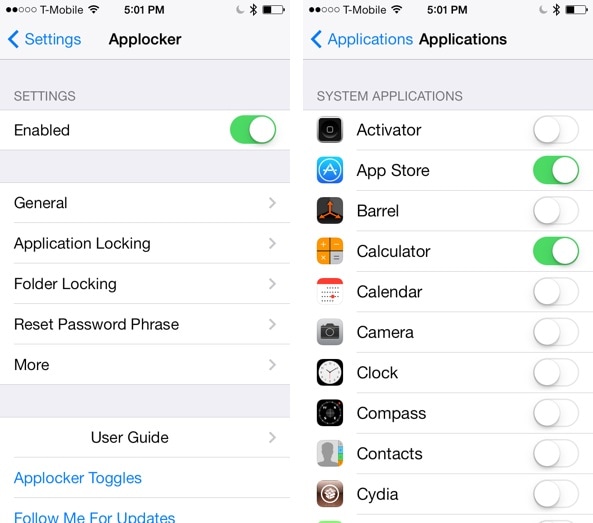
Step 6. From here, you can turn on (or off) the locking feature for apps of your choice.
This will let your app lock the Apple iPhone SE without any trouble. You can also go to the “Reset Password Phrase” to change the passcode.
3. Lock Apps onApple iPhone SE & iPad using BioProtect
Just like Applocker, BioProtect is another third-party tool that works only on jailbroken devices. It can also be downloaded from Cydia’s repository. Apart from apps, you can also use BioProtect to lock settings, SIM features, folders, and more. It is linked to the Touch ID of the Apple iPhone SE device and scans the fingerprint of a user to grant (or deny) access to any app. The app only works on iPhone 5s and later devices, having a Touch ID. However, you can also set a passcode as well if your Touch ID is not working. To use the BioProtect app lock for iPhone, follow these steps:
Step 1. Firstly, get the BioProtect app to lock iPhone on your device from the right http://cydia.saurik.com/package/net.limneos.bioprotect/ .
Step 2. To access the tweak’s panel, you need to provide your fingerprint access.
Step 3. Place your finger on your Touch ID and match its print.

Step 4. This will let you access the BioProtect app settings.
Step 5. Firstly, enable the app by turning the respective feature on.
Step 6. Under the “Protected Applications” section, you can see a list of all the major apps.

Step 7. Simply turn on (or off) the feature of the app that you wish to lock.
Step 8. You can also go to the “Touch ID” feature to further calibrate the app.
Step 9. After setting the lock, you would be asked to authenticate using your fingerprint to access the protected app.

Wrap it up
By following these solutions, you would be able to learn how to lock apps on the Apple iPhone SE without much trouble. We have provided both, third-party as well as native solutions to app lock the Apple iPhone SE in a secure manner. You can go with your preferred option and provide an added layer of security on your device to keep it safe.
- Title: How to Remove and Reset Face ID on Apple iPhone SE
- Author: Sophia
- Created at : 2024-07-15 00:12:15
- Updated at : 2024-07-16 00:12:15
- Link: https://ios-unlock.techidaily.com/how-to-remove-and-reset-face-id-on-apple-iphone-se-by-drfone-ios/
- License: This work is licensed under CC BY-NC-SA 4.0.

